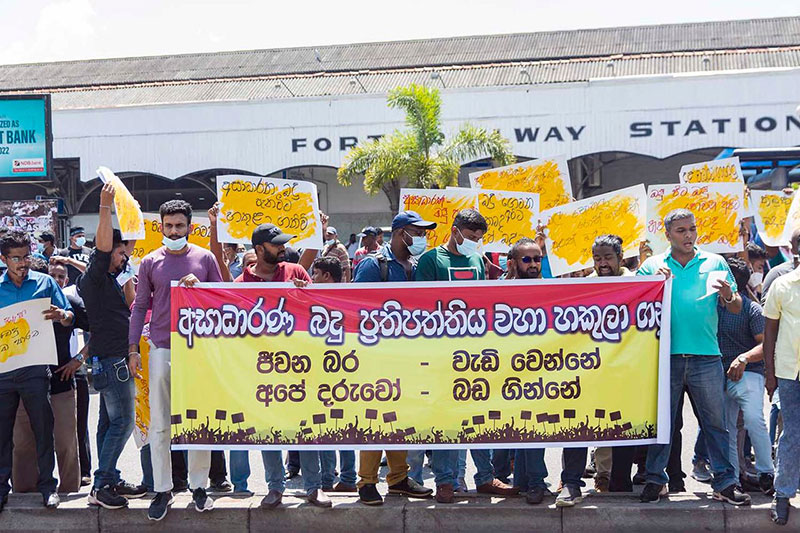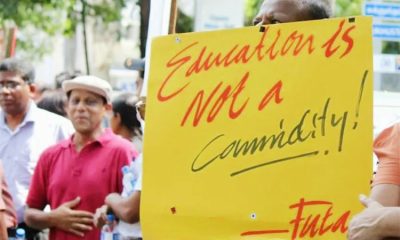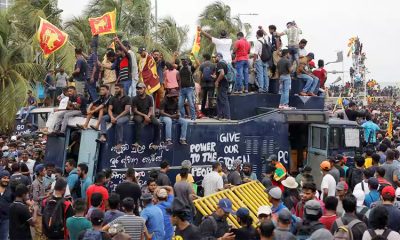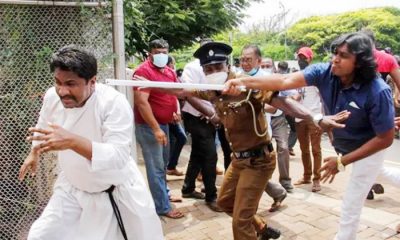Features
Govt. notches up success but at a cost

by Jehan Perera
Morality is being concerned about the wellbeing of others and ensuring the common good which is what the government needs to work on. The philosopher John Locke said, “To love our neighbour as ourselves is such a truth for regulating human society, that by that alone one might determine all the cases in social morality.” The government is vindicating itself in terms of economic success, but not with the common good. The IMF mission has commended the government on its success in meeting its revenue targets. Its senior mission chief for Sri Lanka, Peter Breuer noted “you’re collecting the revenue that’s needed to address the cause of the crisis. So, that really is very good news.” The problem is that the government is collecting that revenue in ways that is causing misery to the many but is sparing others, especially those most responsible for putting the country into the predicament it is currently in.
The government is meeting those financial obligations primarily by taxing the people many of whom have fallen below the poverty line (more than a quarter of the population) and whose children look visibly malnourished especially in the more remote rural areas. This has been through a combination of methods. The tax net has been widened, much to the consternation of the general population with everyone over the age of 18 being compelled to register for a tax number and now includes even those in lower income brackets such as drivers of passenger vehicles who had never thought of paying taxes before. The personal tax rates have also been increased significantly, doubling and tripling the taxation levels for those in higher income brackets. While some categories of people can afford to pay these taxes, even they have to either draw on their savings or cut back on other expenses they had taken for granted.
The downside of the government’s achievement in meeting the IMF targets is the massive extraction of tax revenue from the entire population through the Value-added-tax (VAT) which has to be paid by people at every level irrespective of their earning and purchasing power. This is a regressive tax as it hits those who are poorer much harder than those who are richer. The 18 percent VAT now applies to nearly every tradable item unlike in the past when many items were exempted, is proving to be the straw that broke the camel’s back for those on the margins of existence. However, the unfairness in this imposition of tax burden is that owners and shareholders and employees of loss-making big businesses have been spared the burden of paying up, as the debt of those companies that are deemed “too big to fail” are being bailed out or forgiven or are not charged by the banks or tax authorities at the present time.
YUKTHIYA
CHALLENGED
A similar phenomenon of sparing those who make the billions but catching those lower in the hierarchy can be seen in the war against drugs that the government has launched. The Human Rights Commission of Sri Lanka has stated that the Yukthiya (Justice) Operation, launched with the objective of combating drug trafficking and organised crime, has reportedly led to the arrest of over 20,000 suspects in just a two-week span from December 17 to December 31, 2023 (The figure is now nearer 30,000). While acknowledging the importance of addressing organised crime and narcotics trafficking, the Human Rights Commission stated it has received numerous complaints of torture, inhumane treatment, arbitrary arrests, and detentions associated with the operation.
The drug problem in the country has been getting worse over the years, which is a phenomenon that corresponds to what is happening in the world. The problem in Sri Lanka is compounded by the fact that the country is a transshipment point, which makes it possible for those who enjoy impunity due to their political and other power to make a killing. There are numerous rags to riches stories of those who are today rich and powerful being implicated in the drug trade. The question is whether the current effort of the government to subdue the drug trade will continue and be sustainable, or wheather it will be like the war against drugs carried out by a former president of the Philippines, where thousands of people were mercilessly killed on the streets by the security forces on the grounds of being involved in the drug trade but the problem continues even though that president is gone.
The government campaign to control drugs is now being subjected to international condemnation. The UN High Commissioner for Human Rights Volker Türk has urged the government to review its ongoing Yukthiya operation, and to implement human rights-based approaches, notably the right to health, in addressing the issues of illicit drugs in society. He has pointed out that “People who use drugs should be provided with appropriate support and programmes that the root causes of addiction and assist their reintegration into society. The UN Human Rights Office last year issued a report calling on States to develop effective drug policies, including by considering the decriminalisation of drug use and the possession of drugs for personal use.” This thinking is not heeded by a government that ignores court verdicts regarding the need to deal with human rights abusers in the government system.
RED SEA
The government’s thinking with regard to national issues is being extended to its international relations also. The decision to send the Sri Lankan navy to the Red Sea as part of a joint international mission to protect international shipping against attack is being justified by the government as protecting Sri Lanka’s economic interests. Fortunately, wiser counsel and pressure from ambassadors to Middle Eastern countries who met President Ranil Wickremesinghe appears to have prevailed. The president appears to have backed down from the earlier approach, which showed little awareness of Sri Lanka’s real position in the international community, and is reported to have said that Sri Lanka wants to see an immediate ceasefire in Gaza and will send aid to Gaza once the hostilities end.
Due to the problems in the Red Sea international shippers now prefer to use Colombo port rather than use the short cut through the Red Sea where their ships may come under attack. Container volumes handled by the Sri Lanka Ports Authority-owned terminal has seen a growth of around 80 percent in recent days following the increased attacks on commercial vessels plying the Red Sea. Therefore, the economic justification for getting involved in military action is difficult to see. According to Y.N. Jayarathna, retired Rear Admiral and hydrographer, “There will be operational costs, and there will be maintenance costs. The cost of diesel, alone for an offshore patrol vessel for a one-month patrol, comes to about Rs 60 million. There is a huge cost, and the government has to be ready for it.”
The wars that big powers fight by proxy have got to stop in the interests of the world’s economy and innocent people. This applies to both the Gaza and Ukraine wars that are dragging on and on at great cost to civilians who are helpless and like sitting ducks. So many lives and property have been destroyed that it is a crime against humanity. Instead of joining one group of countries in military action against another group, Sri Lanka needs to use its good offices as a country that once gave leadership to the non-aligned group of countries to address the root causes of the conflict in the Red Sea area and other parts of the world. The aim of government needs to be the common good, not the wellbeing of the majority or minority, but the wellbeing of all. There is a need for moral leadership in the conduct of both national and international relations that the government needs to provide.
Features
Kashmir terror attack underscores need for South Asian stability and amity

 The most urgent need for the South Asian region right now, in the wake of the cold-blooded killing by gunmen of nearly 30 local tourists in Indian-administered Kashmir two days back, is the initiation of measures that could ensure regional stability and peace. The state actors that matter most in this situation are India and Pakistan and it would be in the best interests of the region for both countries to stringently refrain from succumbing to knee-jerk reactions in the face of any perceived provocations arising from the bloodshed.
The most urgent need for the South Asian region right now, in the wake of the cold-blooded killing by gunmen of nearly 30 local tourists in Indian-administered Kashmir two days back, is the initiation of measures that could ensure regional stability and peace. The state actors that matter most in this situation are India and Pakistan and it would be in the best interests of the region for both countries to stringently refrain from succumbing to knee-jerk reactions in the face of any perceived provocations arising from the bloodshed.
The consequences for the countries concerned and the region could be grave if the terror incident leads to stepped-up friction and hostility between India and Pakistan. Some hardline elements in India, for instance, are on record in the international media as calling on the Indian state to initiate tough military action against Pakistan for the Kashmiri terror in question and a positive response to such urgings could even lead to a new India-Pakistan war.
Those wishing South Asia well are likely to advocate maximum restraint by both states and call for negotiations by them to avert any military stand-offs and conflicts that could prove counter-productive for all quarters concerned. This columnist lends his pen to such advocacy.
Right now in Sri Lanka, nationalistic elements in the country’s South in particular are splitting hairs over an MoU relating to security cooperation Sri Lanka has signed with India. Essentially, the main line of speculation among these sections is that Sri Lanka is coming under the suzerainty of India, so to speak, in the security sphere and would be under its dictates in the handling of its security interests. In the process, these nationalistic sections are giving fresh life to the deep-seated anti-India phobia among sections of the Sri Lankan public. The eventual result will be heightened, irrational hostility towards India among vulnerable, unenlightened Sri Lankans.
Nothing new will be said if the point is made that such irrational fears with respect to India are particularly marked among India’s smaller neighbouring states and their publics. Needless to say, collective fears of this kind only lead to perpetually strained relations between India and her neighbours, resulting in regional disunity, which, of course would not be in South Asia’s best interests.
SAARC is seen as ‘dead’ by some sections in South Asia and its present dysfunctional nature seems to give credence to this belief. Continued friction between India and Pakistan is seen as playing a major role in such inner paralysis and this is, no doubt, the main causative factor in SARRC’s current seeming ineffectiveness.
However, the widespread anti-India phobia referred to needs to be factored in as playing a role in SAARC’s lack of dynamism and ‘life’ as well. If democratic governments go some distance in exorcising such anti-Indianism from their people’s psyches, some progress could be made in restoring SAARC to ‘life’ and the latter could then play a constructive role in defusing India-Pakistan tensions.
It does not follow that if SAARC was ‘alive and well’, security related incidents of the kind that were witnessed in India-administered Kashmir recently would not occur. This is far from being the case, but if SAARC was fully operational, the states concerned would be in possession of the means and channels of resolving the issues that flow from such crises with greater amicability and mutual accommodation.
Accordingly, the South Asian Eight would be acting in their interests by seeking to restore SAARC back to ‘life’. An essential task in this process is the elimination of mutual fear and suspicion among the Eight and the states concerned need to do all that they could to eliminate any fixations and phobias that the countries have in relation to each other.
It does not follow from the foregoing that the SAARC Eight should not broad base their relations and pull back from fostering beneficial ties with extra-regional countries and groupings that have a bearing on their best interests. On the contrary, each SAARC country’s ties need to be wide-ranging and based on the principle that each such state would be a friend to all countries and an enemy of none as long as the latter are well-meaning.
The foregoing sharp focus on SAARC and its fortunes is necessitated by the consideration that the developmental issues in particular facing the region are best resolved by the region itself on the basis of its multiple material and intellectual resources. The grouping should not only be revived but a revisit should also be made to its past programs; particularly those which related to intra-regional conflict resolution. Thus, talking to each other under a new visionary commitment to SAARC collective wellbeing is crucially needed.
On the question of ties with India, it should be perceived by the latter’s smaller neighbours that there is no getting away from the need to foster increasingly closer relations with India, today a number one global power.
This should not amount to these smaller neighbours surrendering their rights and sovereignty to India. Far from it. On the contrary these smaller states should seek to craft mutually beneficial ties with India. It is a question of these small states following a truly Non-aligned foreign policy and using their best diplomatic and political skills to structure their ties with India in a way that would be mutually beneficial. It is up to these neighbours to cultivate the skills needed to meet these major challenges.
Going ahead, it will be in South Asia’s best interests to get SAARC back on its feet once again. If this aim is pursued with visionary zeal and if SAARC amity is sealed once and for all intra-regional friction and enmities could be put to rest. What smaller states should avoid scrupulously is the pitting of extra-regional powers against India and Pakistan in their squabbles with either of the latter. This practice has been pivotal in bringing strife and contention into South Asia and in dividing the region against itself.
Accordingly, the principal challenge facing South Asia is to be imbued once again with the SAARC spirit. The latter spirit’s healing powers need to be made real and enduring. Thus will we have a region truly united in brotherhood and peace.
Features
International schools …in action

 The British School in Colombo celebrated the 2025 Sinhala and Tamil New Year with the traditional rites and rituals and customs unique to the island nation, during a special Avurudu Assembly held at the school premises.
The British School in Colombo celebrated the 2025 Sinhala and Tamil New Year with the traditional rites and rituals and customs unique to the island nation, during a special Avurudu Assembly held at the school premises.
Students from all over the world, who are part of The British School in Colombo, gathered to celebrate this joyous event.
The special assembly featured traditional song and dance items from talented performers of both the Junior and Senior Schools.
On this particular day, the teachers and students were invited to attend school in Sri Lankan national costume and, among the traditional rituals celebrated, was the boiling of the milk and the tradition of Ganu-Denu.

Boiling of
the milk
In the meanwhile, a group of swimmers from Lyceum International School, Wattala, visited Australia to participate in the Global-ISE International Swimming Training Programme in Melbourne.
Over the course of 10 days, the swimmers followed an advanced training schedule and attended sessions at the Melbourne Sports and Aquatic Centre (MSAC), Victoria’s Nunawading Swimming Club, and Camberwell Grammar School.
In addition to their training, the group also explored Melbourne, with visits to key landmarks, such as the Parliament House and the Melbourne Cricket Ground (MCG), along with city tours and cultural experiences.

Traditional dance item

Tug-of-war contest

On arrival in Melbourne, Lyceum International School, Wattala, with Sri Lankan officials
Features
Perfect … and healthy

 Got a few more beauty tips to give you … for a perfect complexion, or, let’s say, a healthy skin.
Got a few more beauty tips to give you … for a perfect complexion, or, let’s say, a healthy skin.
* Honey Face Mask:
Take a tablespoon of raw honey and then warm it up by rubbing it with your fingertips. Apply the warm honey all over your face. Let this natural mask stand for about 10 minutes and then wash it off gently with warm water.
* Coconut Milk Face Mask:
You need to squeeze coconut milk out of a grated raw coconut and apply this milk all over your face, including your lips.
(This will help you gain a glowing skin. It is one of the best natural tips for skin care)
* Orange, Lemon, and Yoghurt Moisturiser:
To prepare this moisturiser, you need a tablespoon of orange juice, a tablespoon of lemon juice and a cup of plain yoghurt.
Mix them together and apply the paste all over your face, leaving it as a mask for 10 to 15 minutes. Next, take a damp handkerchief and use it to clean your face.
(This moisturiser brightens the complexion of your skin)
* Cucumber and Lemon:
Apply equal parts of cucumber and lemon juice on your face before taking a bath. Allow it to sit for 10 minutes before rinsing it off. This natural face beauty tip will brighten your skin tone and lighten blemishes if used on a regular basis. The best aspect is that it is appropriate for all skin types!
* Healthy Diet:
Aside from the effective home remedies, there are certain other factors to consider for skin care – and the first of them is your diet. Without the right nutrients, your skin cannot reverse the damage it suffers every day.
Eat fruits that are high in vitamin C because they contain antioxidants.
Adjust your diet to get the right amount of protein and unsaturated fats, as well as fresh green vegetables. All of this provides the right amount of nutrients so your skin can heal and improve itself naturally.
* Sun Protection and Care:
Another thing to keep in mind is not to step out of your home without sunscreen, especially with this awful heat we are experiencing at the moment. The hard rays of the sun can do you more damage than you could ever imagine.
By the way, you can prepare your own sunscreen lotion with glycerin, cucumber juice and rose water. You can also keep this lotion in the fridge.
-

 Business6 days ago
Business6 days agoDIMO pioneers major fleet expansion with Tata SIGNA Prime Movers for ILM
-

 News5 days ago
News5 days agoFamily discovers rare species thought to be extinct for over a century in home garden
-

 Features7 days ago
Features7 days agoProf. Lal Tennekoon: An illustrious but utterly unpretentious and much -loved academic
-

 Foreign News6 days ago
Foreign News6 days agoChina races robots against humans in Beijing half marathon
-

 Features3 days ago
Features3 days agoRuGoesWild: Taking science into the wild — and into the hearts of Sri Lankans
-

 Editorial6 days ago
Editorial6 days agoSelective use of PTA
-

 News3 days ago
News3 days agoOrders under the provisions of the Prevention of Corruptions Act No. 9 of 2023 for concurrence of parliament
-

 Features4 days ago
Features4 days agoNew species of Bronzeback snake, discovered in Sri Lanka
























